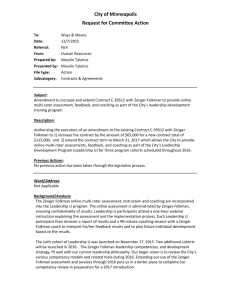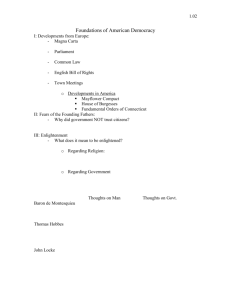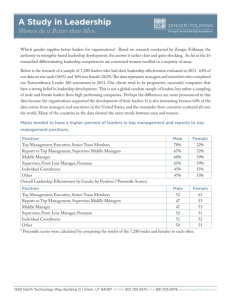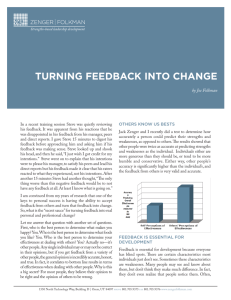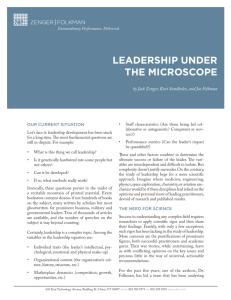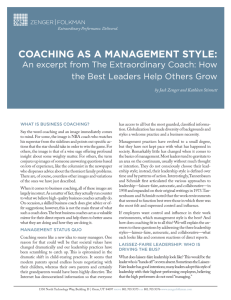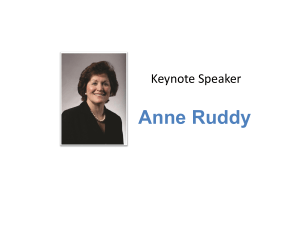Client Name - Zenger Folkman
advertisement
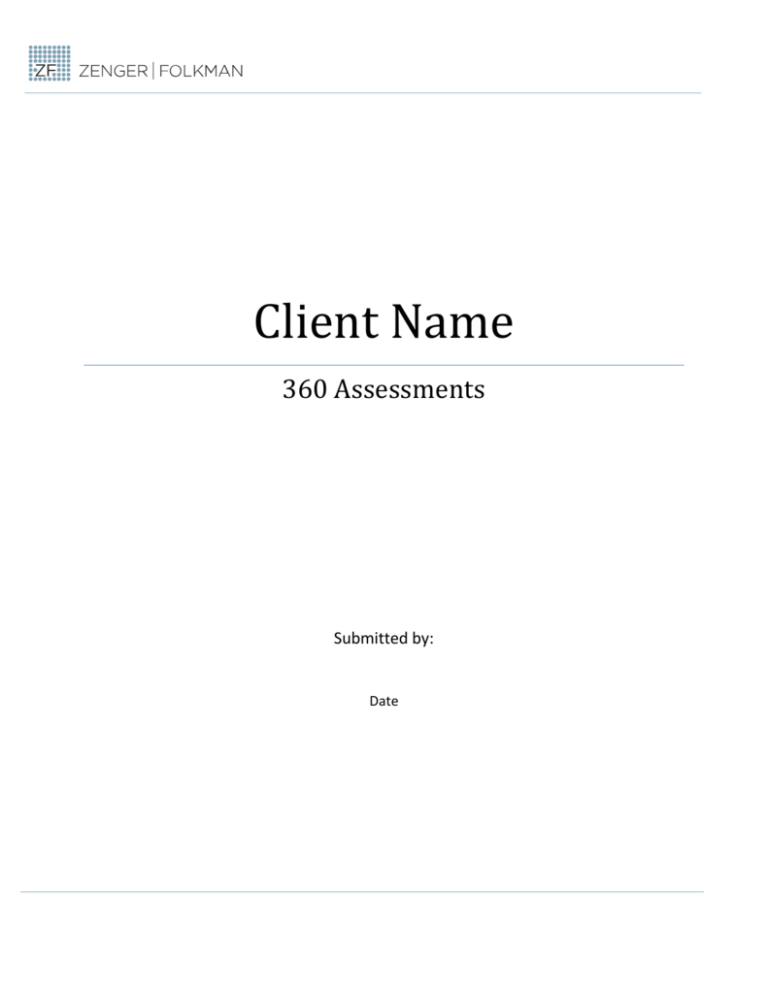
Client Name 360 Assessments Submitted by: Date Philosophy/Approach Zenger Folkman is one of the world’s premier providers of leadership research, assessment, development and implementation programs. We are best known for our unique evidence-driven, strengths-based approach to developing extraordinary leaders at all levels and demonstrating the business results and performance improvements they generate for their organizations. Zenger Folkman was co-founded by Dr. Jack Zenger and Dr. Joe Folkman in 2003. The firm grew out of the ground-breaking research behind The Extraordinary Leader: Turning Good Managers into Great Leaders (McGraw-Hill, 2001). Dr. Jack Zenger is considered an international expert in the field of leadership development. He was honored in 2011 with the American Society of Training and Development Lifetime Achievement Award in Workplace Learning and Performance. Dr. Joe Folkman is a noted psychometrician recognized for his expertise in creating statistically valid assessments. Their work has been published in the Harvard Business Review, Wall Street Journal’s National Business Employment Weekly, Newsweek, and other publications worldwide. What is your 360 assessment philosophy? Zenger Folkman recognizes that 360 degree multi-rater feedback provides leaders with valuable empirical data revealing how others perceive their strengths and weaknesses. Our strength based approach is powerful as it resonates with the end user. They see that by working on a few areas that they select and are passionate about they can have true impact on their performance and the performance of the business. The approach is manageable and engaging. Our research on the best-in-class 360s identified these components of the most effective instruments: Focus on empirically derived competencies and items which truly differentiate high performers from mid and low performers Response scale that avoids false positive Scores compared to a high standard, recognizing the incredible organizational impact of the highest performing leaders 2 Measure of a leader’s current impact on direct reports which highlights the correlation between the effectiveness of a leader and the satisfaction and engagement of employees Identification of the most important competencies for a given role recognizing that for a given leader, not all competencies are equally relevant An emphasis on building strengths to transform a potential negative experience into a positive one of self-discovery and increased awareness Written comments focused on fixing fatal flaws, not making minor improvements, recognizing that extraordinary leadership is not the absence of weakness, but the possession of a handful of profound strengths Data security and administration by a third party to protect the confidential nature of 360-degree assessment and increase responder certainty that their candid feedback is anonymous Reports that are simple and intuitive allow participants to understand and act on the feedback Designed to provide insights to build on strengths in a way that is more effective than intuitive, linear behavior focused on filling the gaps or fixing weaknesses Please describe the research used to develop your 360 tool. In the initial research, Zenger Folkman gathered statistical data on over 2,000 items from 200,000 evaluations of 20,000 leaders. The data was analyzed to determine what items differentiated the best from the worst performers. The research also identified powerful combinations of behaviors at the heart of non-linear development. These combinations are the foundation of our strengths-based approach shared in the Competency Companion Development guide that accompanies the personal feedback reports. How much capability do you have to customize your templates, tools and assessments based on Clients needs? 3 Our customization process includes: o Review current Client Leadership Capabilities o Explore synergies between Zenger Folkman’s database and Client model to identify already researched items and those where additional study is necessary o Build a first draft 360 that includes a variety of items including those from our foundational research, custom projects and new research based on items unique to Client o Consult with a Clients’ steering committee to select the items that most resonate with the organization’s culture and goals. Work with steering committee to gain appropriate executive approval o Set-up and test the survey on Zenger Folkman and Clients systems o Customize support materials including but not limited to participant materials, non-linear development guide, step-by-step feedback analysis, and individual development plan o Conduct pilot program and incorporate feedback o Launch, monitor feedback and revise as necessary o Update norms as data pool grows Share your philosophy regarding ownership of response data and results. We believe that the individual data belongs to the participant to be used as a tool for development. We can provide the organization with aggregate data that preserves anonymity while giving leadership important insights into general profiles and trends, Including highest scored items, lowest scored items, competencies collectively rated as most important, etc. Administration Provide a description of the process flow. Who all needs to be involved? Client has internal administrative resources trained by Zenger Folkman and access to our 360 degree feedback assessment platform. This enables you to initiate surveys, register respondents, monitor response rates and print reports. Participant information is provided to internal Client administrators or Zenger Folkman Client Services 4 Clients’ administrators or Zenger Folkman Client Services set up a new project and adds participants to Zenger Folkman’s assessment system. The Zenger Folkman assessment system sends an email to participants providing them with a URL link, containing a unique ID and password for each participant. The email will also contain instructions for inviting respondents (feedback requests). Each participant must enter the names and email addresses of their respondents and identify the relationship between each of the respondents and the participant. Each participant completes a self-assessment that is accessed through the same URL provided by the Zenger Folkman assessment system for the initial participant set-up. The Zenger Folkman assessment system sends an email with the applicable assessment, and assessment submission deadline, to each respondent. Every seven days until the survey is completed or the assessment deadline has been reached, the Zenger Folkman assessment system will send an email to the Client Coordinator containing a status report of all participants and the number of surveys completed by their respective respondents. The system will send followup emails to all respondents until they have provided the requested feedback by completing the survey. Nine calendar days prior to the start of the upcoming workshop, the Clients’ administrators or Zenger Folkman Client Services will close the survey, generate the feedback reports and print and ship them along with the workshop materials. What type of administrative support do you provide during the entire assessment process? The Client Services team at Zenger Folkman supports the instrument administration from initial set-up to distribution of the feedback report and support materials. Zenger Folkman's 360 system has a feature that allows one or more individuals within a client organization to monitor the progress of people who are participating in the 360 survey process. These individuals can view how many people are registered in the projects they are monitoring, how many feedback survey responses they have received, etc Client Services monitors an email box for questions/issues and provides support within a matter of hours. Will detailed instructions be provided? Yes. A communication is sent to participants when the survey is launched. It includes information about identifying and inviting respondents, completing self-assessment, monitoring response rate and preparing for the debrief process. 5 In addition, our experience tell us that an intracompany email message (from the Client Coordinator or Stakeholder) providing detail about the outcome of the survey, suggestions for selecting respondents and from whom the survey communication will come is very effective. Additionally, we work with clients to customize messaging to support an effective implementation. One element of additional instruction includes prerecorded slide shows to provide instruction for participants, their managers and respondents. (Need to get current URL addresses from Utah- English only) What type of global support do you provide? Zenger Folkman has a global network of trusted international partners. With our global database of over 50,000 leaders, Zenger Folkman and our partner network have proven that our approach to leadership development is universal and delivers improved business outcomes in all parts of the world. Our network of strategic partners have been carefully selected and qualified, and our leadership development programs are now being delivered in more than 30 countries and a dozen languages. These partnerships give Zenger Folkman the capability to effectively manage and deliver global leadership development implementations with local delivery and language expertise. Folkman S Europe United Kingdom (English) The Netherlands (Dutch, English) Italy (Italian, English, German, French) Spain (Spanish, Portuguese, English) Portugal (Portuguese, Spanish, English) Asia/Pacific Australia (English) China (Mandarin, English) Hong Kong (English) India (English) Japan (Japanese, English) New Zealand (English) Singapore (English) Vietnam (Vietnamese, English) 6 Latin America Mexico (Spanish, English) Columbia (Spanish, English) Brazil (Portuguese, English) Middle East / Africa South Africa (Afrikaans, English) Egypt (Arabic, English) United Arab Emirates (Arabic, English) Mozambique (Portuguese, English) Many of our standard assessments and participant materials have been localized and are available in multiple languages, including Castilian and Latin Spanish, Simplified Chinese, Japanese, Italian, Dutch, Brazilian and European Portuguese, German, French and Arabic. We have 90+ certified facilitators and 250+ consultants in the UK, UAE, Hong Kong, Singapore, Australia, New Zealand, Canada, Spain, Portugal, Brazil, Italy, Netherlands, India, Mozambique, Vietnam, China, Hong Kong, Taiwan, Columbia, Panama, Peru, Ecuador, Costa Rica, Argentina, Japan, Mexico, South Africa, Sub-Saharan Africa, Egypt, Qatar, UAE. Where will your core team supporting Client be located? The Client Services group is based near Salt Lake City, Utah. The current account management team is located in North Carolina, Illinois and Florida. What rating scale do you use? Is it flexible? The rating scale on the standard Extraordinary Leader 360 degree feedback report is a 5 point scale with an option to indicate “Don’t Know - Not Applicable”. This scale was designed to avoid false positives associated with “Agree/Disagree” scales. The rating options are: 5: Outstanding Strength 4: Strength - Top Quartile 3: Competent - Good Performance 7 2: Needs Some Improvement - Inconsistent Performance 1: Needs Significant Improvement - Poor Performance We are able to customize the scale to meet unique needs of our customers. Do you have a recommendation for total number of respondents and groups needed to make the data relevant? Available respondent groups include: Manager, Peer, Direct Report and Other. We suggest participants invite feedback from at least 5 individuals in each of the categories of Peer and Direct Report. If applicable, Other can be used to solicit feedback from second level direct reports, team members or internal/external customers. If there are fewer than 3 respondents in any of those groups, the data is combined with another rater category for reporting. This protects the anonymity of the respondents. Manager data is reported on its own, even when just one manager provides feedback. What is specifically required of Client to initiate the process? Client has internal resources that can access the Zenger Folkman system that enable you to initiate surveys, register respondents, monitor response rates, and print reports. If preferred, we are able to complete these activities on your behalf. To initiate the process, we simply need: o The date of The Extraordinary Leader Workshop or debrief session o The start and end date of the data collection period o The name of the contact for the project o A list of the names and email addresses for the participants An order form is available for capturing this information. We can provide a template if you prefer for Zenger Folkman to enter the names of the respondents to generate invitations on behalf of the participant. 8 What metrics and measurements do you put in place to make sure the project is on track, meeting expectations, and functioning efficiently? The key to a successful, impactful 360 degree assessment is having enough data from selected respondents. We provide the means for the project coordinator and individual participants to monitor response rates. We do not disclose which individuals have responded, but do share the return rate. System-generated reminders are emailed to those who have not completed the survey. Our best practice is to send reminders two weeks before the deadline, one week before the deadline and on the deadline date. The frequency of these reminders can be adjusted to meet your needs. Share your timeline for assessment implementation. Sample guidelines to prepare for an assessment and development event are: Step 1. Choose a date for the workshop or debrief session. This should be determined 6 to 8 weeks prior to launching the survey process within your organization Confirm date Schedule the facilitator or debriefer Communicate date to internal administrator or ZFCO Step 2. Set Survey Launch (Start) date Ideally, this should be 5 to 8 weeks prior to the event date Additionally, set a date 1 to 5 days prior to the launch date for sending out an email (pre-survey launch communication) to participants telling them that they have been selected to participate, how this ties to the organization’s leadership development goals, what the survey process consists of, etc. Step 3. Set survey deadline—the date by which all survey submissions must be received This should be approx 3 to 4 weeks following the launch date and at least 7 to 10 days prior to the debrief date Step 4. Initiate with internal Client resource or complete the Project Order Form and submit to Zenger Folkman Client Services Email it to your Client Services representative 72 hours prior to the requested survey launch date 9 Send your pre-survey launch communication to all participants as scheduled Technology & Reporting Does your tool offer flexibility or the ability to customize? The Zenger Folkman 360 degree feedback survey can be customized to measure behaviors related to client’s leadership competency areas. How many assessors are allowed to be involved in any given participant`s 360 assessment? There is no maximum number of people who can respond. Our experience suggests that asking more people does not always give more insightful results. We guide people to thoughtfully select those they have worked with on a professional level for a long enough period of time to accurately assess the participant’s leadership skills. What types of reports are generated? Zenger Folkman programmers can format individual and aggregate reports to meet your needs. Standard reports include: Full individual feedback report Reassessment feedback report Aggregate report Executive summary All reports compare scores to 75th and 90th percentile of our global database. When applicable, the Client norms can be regularly updated to reflect current data. Zenger Folkman global norms are updated annually. Do you provide any summary reports? How Often? We provide summary/aggregate reports as requested. What type of report do you provide to the employee following their assessment? Individuals taking the assessment the first time receive a Participant Feedback Report. 10 Those who are taking the Zenger Folkman 360 for a second time receive a report comparing the scores from the two assessments. Do your standard reports have some type of development component? The Zenger Folkman standard feedback report is designed to provide insights on how a participant can develop strengths or remedy any fatal flaws. During the analysis process that is conducted in a one-day workshop or a one-on-one coaching format; participants use their results to consider their competence, passion and the organization’s needs in order to identify a developmental focus and complete an individual development plan. In addition, Zenger Folkman’s Competency Companion Development Guide is an important companion piece designed to enable participants to leverage powerful combinations in their development effort. What type of aggregate analysis do you provide? Zenger Folkman can provide aggregate analysis in any combination of like surveys that you would find valuable. It can be presented in an aggregate report or in an executive overview slide deck. Participant Experience Describe what processes you have in place to ensure a positive experience for the end user when completing a 360 assessment. The most impactful cost of a 360-degree assessment is the time it takes personnel to complete it. With this is mind, our surveys are designed to be completed in 15 to 20 minutes. We find the completion rate of a shorter survey is much higher than for a longer survey. It is also important for respondents to feel they are providing feedback on areas that matter to the participant and to the organization. We have been able to identify 4-5 predictive items for each competency that are descriptive of the related behavior. We focus on what is most important. Directions for a survey must be easy to follow. We provide clear instructionss in the email that contains the link to the survey and with the survey itself. The process itself is quite intuitive. Finally, respondents must feel confident that their responses are anonymous. Data security and respondent confidentiality is the highest priority for Zenger Folkman. Our experience and research shows us that anonymity is one of the most important drivers 11 behind honest feedback. If users feel there is a risk that potentially negative feedback can be tied back to them, they are less likely to be truly honest. Anonymity produces more accurate feedback. More information about the protections we have in place is available upon request. What is required of each participant during the process? Participants are asked to: watch their inbox for instructions for completing the survey identify and invite respondents complete their own self-assessment monitor their response rate set aside time for the workshop or one-on-one debrief What type of upfront development do you provide to those being assessed and their assessors? 360s have the best results in organizations where expectations are clear. It is particularly important that it is clear that the assessment is for developmental purposes and is not for performance evaluation. Our support varies according to our client organization’s needs. We have created and delivered client-specific webinars to prepare the organization and tie the assessment to key business initiatives. Coaching Model/Approach Do you have a specified model for the de-briefing process? There are two options for debriefing the 360 assessment: a 1 day workshop or one-onone coaching conversations. The key insights and tools of The Extraordinary Leader workshop are: “Good” does not equal “great” You don’t have to be perfect to be an extraordinary leader. Perceptions of you are others’ reality. To get where you are going, you need to know where you are. o Tool: 360 Assessment Feedback Report 12 When choosing which strengths to develop, play to your passions! When building on strengths, often the best approach is to build around them. o Tool: The Competency Companion Development Guide The more people you involve in your development, the greater the likelihood of improvement. One-on-one debriefs are based on the same elements, formatted to accommodate individual conversations. Client facilitators and coaches can be certified to conduct de-briefs in either format. In addition to your team, Zenger Folkman has resources to deliver the workshop and debrief sessions. Do de-briefers need to be certified? What is that process? Yes. The Zenger Folkman Coaching the Extraordinary Leader workshop (CTEL) is a one-day program which provides skilled coaches with the training and license to use the Extraordinary Leader 360-degree Assessment and Development Guide with those they coach. The CTEL workshop is designed to 1) educate de-briefers about the Extraordinary Leader research and strengths-based approach to development, and 2) equip them with a proven process and the necessary tools and skills to coach leaders using Zenger Folkman’s Extraordinary Leader 360-degree Assessment. De-briefers are presented with the key highlights from The Extraordinary Leader Workshop, including: The Extraordinary Leader strengths-based development concepts and research The purpose and unique components of the 360-degree assessment How to interpret appropriately and use the reported feedback How to use the Extraordinary Leader Competency Companion Development Guide to build a strengths-based, actionable development plan CTEL can be delivered in a one-day workshop or through a series of live webinars. What ongoing support do you provide for de-briefers? De-briefers have access to support from a variety of Zenger Folkman resources. We are quite willing to partner with Client to craft a formal support process that supports your needs. Elements can include a dedicated resource for questions and concerns, periodic conference calls for the de-briefer group, and formal continuing education experiences. 13 Do you offer tools and resources for the employees to analyze their own results following the de-briefing? If so, what are they? During the de-brief process participants should receive a Step-by-Step Analysis, Development Plan and a Competency Companion Development Guide. These tools all lend themselves to support employee’s post-debrief analysis. Discuss the level of support provided for interpreting the results? Client has several internal resources who have been certified as de-briefers. Zenger Folkman can support their further development, certify additional resources, or provide executive coaches and facilitators to assist in interpretation and leadership development planning. What tools do you have, if any, beyond the 360 assessment to help employees and leaders take positive action based on the feedback and become better leaders (i.e., what happens after the debrief on the results)? Zenger Folkman believes that the 360 assessment is only the beginning of a leader’s developmental path. The next steps and tools that must be implemented are: The Extraordinary Leader workshop or one-on-one coaching by a Zenger Folkman certified coach to understand the feedback The Competency Companion Development Guide which enables leaders to understand the relationship between competencies and how best to leverage strengths by building around those behaviors during their development The Extraordinary Leader Development Plan that includes specific and intentional behaviors that will be incorporated into a leader’s daily role to increase their leadership effectiveness 14
